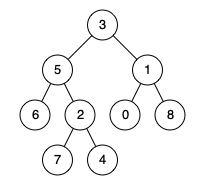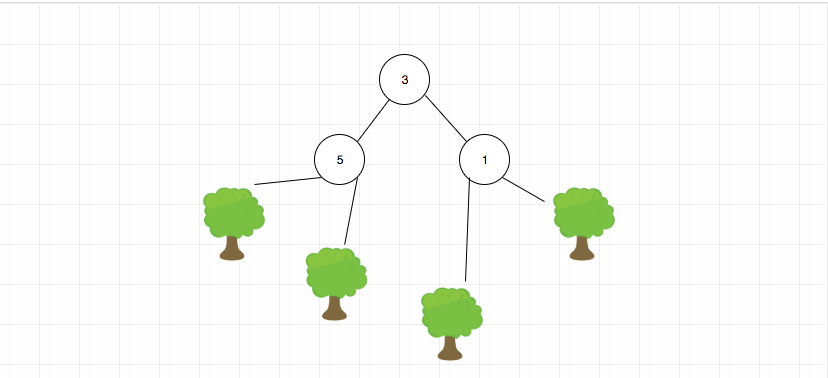题目地址
https://leetcode.com/problems/lowest-common-ancestor-of-a-binary-tree/description/
题目描述
Given a binary tree, find the lowest common ancestor (LCA) of two given nodes in the tree.
According to the definition of LCA on Wikipedia: “The lowest common ancestor is defined between two nodes p and q as the lowest node in T that has both p and q as descendants (where we allow a node to be a descendant of itself).”
Given the following binary tree: root = [3,5,1,6,2,0,8,null,null,7,4]
Example 1:
Input: root = [3,5,1,6,2,0,8,null,null,7,4], p = 5, q = 1
Output: 3
Explanation: The LCA of nodes 5 and 1 is 3.
Example 2:
Input: root = [3,5,1,6,2,0,8,null,null,7,4], p = 5, q = 4
Output: 5
Explanation: The LCA of nodes 5 and 4 is 5, since a node can be a descendant of itself according to the LCA definition.
Note:
All of the nodes' values will be unique.
p and q are different and both values will exist in the binary tree.
思路
这道题目是求解二叉树中,两个给定节点的最近的公共祖先。是一道非常经典的二叉树题目。
我们之前说过树是一种递归的数据结构,因此使用递归方法解决二叉树问题从写法上来看是最简单的,这道题目也不例外。
用递归的思路去思考树是一种非常重要的能力。
如果大家这样去思考的话,问题就会得到简化,我们的目标就是分别在左右子树进行查找p和q。 如果p没有在左子树,那么它一定在右子树(题目限定p一定在树中), 反之亦然。
对于具体的代码而言就是,我们假设这个树就一个结构,然后尝试去解决,然后在适当地方去递归自身即可。 如下图所示:
我们来看下核心代码:
// 如果我们找到了p,直接进行返回,那如果下面就是q呢? 其实这没有影响,但是还是要多考虑一下
if (!root || root === p || root === q) return root;
const left = lowestCommonAncestor(root.left, p, q); // 去左边找,我们期望返回找到的节点
const right = lowestCommonAncestor(root.right, p, q);// 去右边找,我们期望返回找到的节点
if (!left) return right; // 左子树找不到,返回右子树
if (!right) return left; // 右子树找不到,返回左子树
return root; // 左右子树分别有一个,则返回root
如果没有明白的话,请多花时间消化一下
关键点解析
- 用递归的思路去思考树
代码
/*
* @lc app=leetcode id=236 lang=javascript
*
* [236] Lowest Common Ancestor of a Binary Tree
*
* https://leetcode.com/problems/lowest-common-ancestor-of-a-binary-tree/description/
*
* algorithms
* Medium (35.63%)
* Total Accepted: 267.3K
* Total Submissions: 729.2K
* Testcase Example: '[3,5,1,6,2,0,8,null,null,7,4]\n5\n1'
*
* Given a binary tree, find the lowest common ancestor (LCA) of two given
* nodes in the tree.
*
* According to the definition of LCA on Wikipedia: “The lowest common ancestor
* is defined between two nodes p and q as the lowest node in T that has both p
* and q as descendants (where we allow a node to be a descendant of itself).”
*
* Given the following binary tree: root = [3,5,1,6,2,0,8,null,null,7,4]
*
*
*
* Example 1:
*
*
* Input: root = [3,5,1,6,2,0,8,null,null,7,4], p = 5, q = 1
* Output: 3
* Explanation: The LCA of nodes 5 and 1 is 3.
*
*
* Example 2:
*
*
* Input: root = [3,5,1,6,2,0,8,null,null,7,4], p = 5, q = 4
* Output: 5
* Explanation: The LCA of nodes 5 and 4 is 5, since a node can be a descendant
* of itself according to the LCA definition.
*
*
*
*
* Note:
*
*
* All of the nodes' values will be unique.
* p and q are different and both values will exist in the binary tree.
*
*
*/
/**
* Definition for a binary tree node.
* function TreeNode(val) {
* this.val = val;
* this.left = this.right = null;
* }
*/
/**
* @param {TreeNode} root
* @param {TreeNode} p
* @param {TreeNode} q
* @return {TreeNode}
*/
var lowestCommonAncestor = function(root, p, q) {
if (!root || root === p || root === q) return root;
const left = lowestCommonAncestor(root.left, p, q);
const right = lowestCommonAncestor(root.right, p, q);
if (!left) return right; // 左子树找不到,返回右子树
if (!right) return left; // 右子树找不到,返回左子树
return root; // 左右子树分别有一个,则返回root
};
扩展
如果递归的结束条件改为if (!root || root.left === p || root.right === q) return root; 代表的是什么意思,对结果有什么样的影响?
书籍推荐

